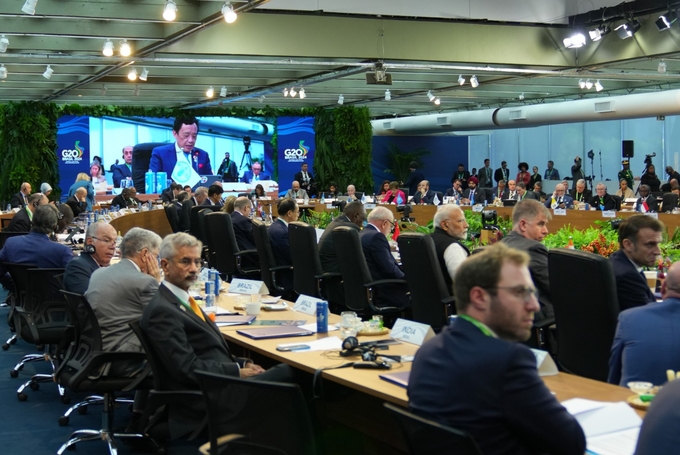May 31, 2025 | 22:42 GMT +7
May 31, 2025 | 22:42 GMT +7
Hotline: 0913.378.918
May 31, 2025 | 22:42 GMT +7
Hotline: 0913.378.918

FAO Director-General QU Dongyu intervenes at G20 summit.
The Director-General of the Food and Agriculture Organization of the United Nations (FAO), QU Dongyu, today urged all FAO Members and partners to join the new Global Alliance Against Hunger and Poverty, which was officially launched today at the G20 Leader’s Summit in Brazil.
The Global Alliance Against Hunger and Poverty, an initiative crafted by the Brazilian presidency of the G20, aims to offer an ambitious and urgent platform for accelerating progress towards achieving the international pledges of eradicating poverty and hunger by 2030 (Sustainable Development Goals 1 and 2) as well as to reduce inequalities (SDG 10).
Speaking at a special session of the G20 Summit on the Fight against Hunger and Poverty, Qu commended the Government of Brazil and President Luiz Inácio Lula da Silva for his personal commitment in bringing hunger, poverty and inequality reduction to the centre of the G20 discussions, with a concrete initiative and actions to support it.
“Achieving zero hunger is possible,” Qu Dongyu said. “It requires even stronger collective efforts and strategies to address the economic, environmental, social and institutional challenges that perpetuate poverty and hunger,” he added.
FAO joined the Global Alliance as a founding member along with other UN agencies, governments, international financial institutions philanthropic foundations and knowledge institutions.
FAO’s role in Global Alliance
Qu highlighted that FAO will host the Support Mechanism of the Global Alliance from the Organization’s headquarters in Rome, in close collaboration with other UN agencies and international financial institutions. The enabling mechanism aims to help optimize the three pillars – knowledge, finance and action – at the country level.
The FAO Director-General noted that the fundamental principle at the heart of the Global Alliance is the power of collective action to support implementation of evidence-based policy instruments and to support efficiencies and complementarities in coordinated financing for real, measurable progress at country level to eradicate hunger and poverty.
FAO will provide technical assistance to implementing countries, putting its considerable comparative advantage in knowledge about food security and inclusive rural development at their disposal, with the goal of bringing knowledge, expertise and best-practice examples to the parts of the world where they are most needed.
The alliance will have a policy basket that brings together successful policies that have achieved impact at scale on eradication poverty and hunger. FAO has contributed extensively to most of the 50 policy instruments identified so far, which range from cash transfer and job guarantee schemes to ways to ensure inclusive finance and credit, so smallholder farmers can access climate-smart technologies, for example.
The Global Alliance entails six “sprints”, which are seen as high-impact areas for early action. They include: School Meals; Cash Transfers; Smallholder and family farming support programs; Socio-economic inclusion programs; Integrated maternal and early childhood interventions; and Water access solutions.
FAO, for example, intends to leverage 128 current programme interventions supporting small-scale producers across all regions to supporting one of the Global Alliance’s “sprint” channels to support smallholder farmers.
Hunger reduction and poverty eradication efforts have been slowed down by the uneven economic recovery from the COVID-19 pandemic, conflicts, impacts of the climate crisis and other causes. Around 733 million people or 9.1 percent of the world population faces chronic hunger and around 2.8 billion people could not afford a healthy diet, according to the latest FAO estimates.
The Director-General has sought to bring FAO’s work with the G7, with the COP summits (COP16 and COP29) and most recently at the Asia-Pacific Economic Cooperation summit in Peru to support the G20’s Global Alliance.
The Alliance “promotes collective action even beyond G20 members” and is a very important mechanism supporting FAO’s efforts to achieve its mandate, he said.
(FAO)

(VAN) Vikas Rambal has quietly built a $5 billion business empire in manufacturing, property and solar, and catapulted onto the Rich List.

(VAN) Available cropland now at less than five percent, according to latest geospatial assessment from FAO and UNOSAT.

(VAN) Alt Carbon has raised $12 million in a seed round as it plans to scale its carbon dioxide removal work in the South Asian nation.

(VAN) Attempts to bring down the price of the Japanese staple have had little effect amid a cost-of-living crisis.

(VAN) Fourth most important food crop in peril as Latin America and Caribbean suffer from slow-onset climate disaster.

(VAN) Shifting market dynamics and the noise around new legislation has propelled Trouw Nutrition’s research around early life nutrition in poultry. Today, it continues to be a key area of research.

(VAN) India is concerned about its food security and the livelihoods of its farmers if more US food imports are allowed.